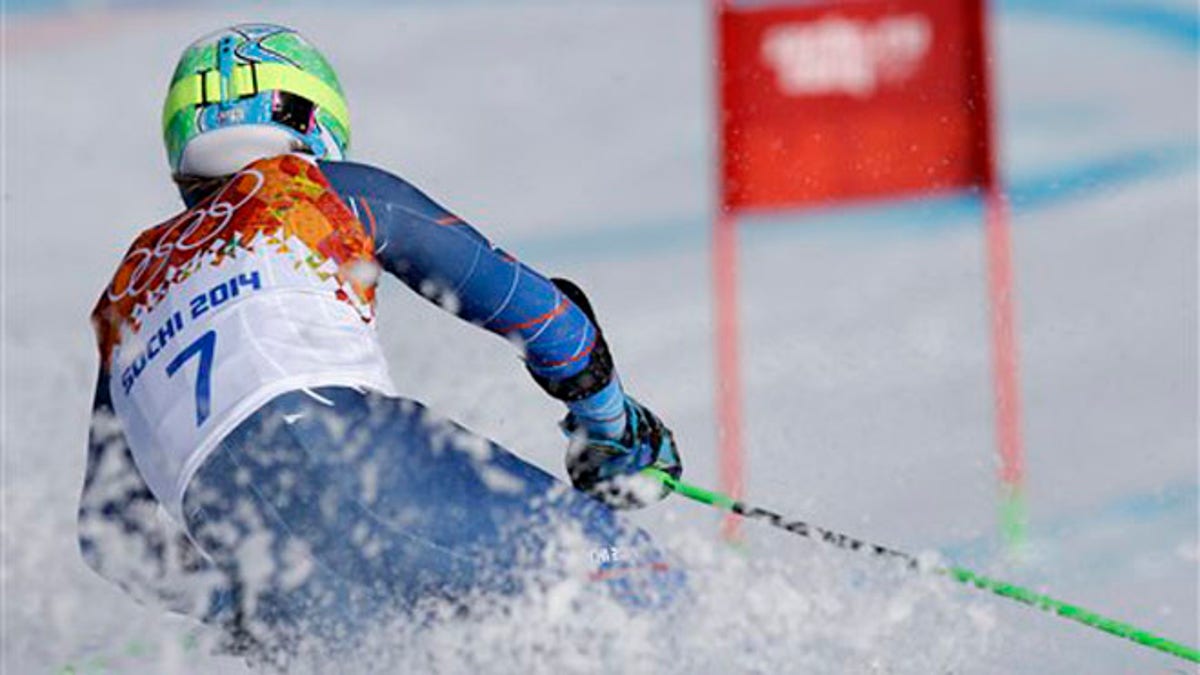
Gold medal winner, United States' Ted Ligety skis in the second run of the men's giant slalom to the Sochi 2014 Winter Olympics, Wednesday, Feb. 19, 2014, in Krasnaya Polyana, Russia. (AP2014)
KRASNAYA POLYANA, Russia (AP) – This was the race Ted Ligety knew he should win.
So did everybody else.
And that, Ligety explained Wednesday after becoming the first American man in Olympic history with two Alpine skiing gold medals, was precisely what made the feat so tough.
Sometimes, being a popular pick can be overwhelming. Ligety learned that four years ago, and dealt with the matter far better on this day.
Scraping the snow with his gloves and hips while taking wide turns around gates, his body swaying left and right with a pendulum's precision, Ligety finished the two-leg giant slalom with a combined time of 2 minutes, 45.29 seconds, winning by nearly a half-second.
His gold is the first for the U.S. Alpine team at the Sochi Games. Yet Ligety's overriding emotion as he fell to the ground in the finish area was something other than pure joy.
"It was a huge relief," said Ligety, a 29-year-old based in Park City, Utah. "All season long, everybody talks about the Olympics, Olympics, Olympics. At a certain point, I was just like, 'Let's do it already. Let's get this thing over with, so we can stop talking about the pressure and everything with it.' So it's awesome to ... finally do it and get the monkey off the back."
He used a perfect first run to open a wide lead of nearly a second, then protected that with a conservative second run that was only 14th-fastest down the Rosa Khutor course as the sun peeked out from behind a nearby peak and through sparse clouds. All in all, much more comfortable conditions than the fog, rain and sleet of a day earlier.
"His first run was flawless, free. He trusted himself. It was his signature skiing," U.S. men's head coach Sasha Rearick said. "The second run was a strategic chess match, which he executed brilliantly."
France earned its first Alpine medals of the Sochi Olympics, with Steve Missilier producing the day's top second leg to earn silver, 0.48 seconds behind Ligety. Alexis Pinturault got the bronze, another 0.16 back. Overall World Cup leader Marcel Hirscher of Austria was fourth, while Bode Miller was 20th in what was his last race of the Sochi Games — and, given that he'll be 40 in 2018, probably of his Olympic career.
Miller, who has won a U.S.-record six Alpine medals, said other racers try to copy Ligety's revolutionary style in the giant slalom, but "he's so much better at it than everybody else."
Ligety maintains momentum by fluidly linking his turns, one into the next, actually taking a longer path down the slope by steering so far from each gate. Opponents cut much closer to gates, but then lose valuable hundredths of a second each time they jerk their bodies in a different direction.
"He carries so much speed and doesn't make mistakes. Those are the things that separate him," Miller explained. "Other guys carry speed for a couple of turns and struggle a bit. He just carries it smooth from top to bottom."
Asked whether Ligety could have been beaten, Missiller replied: "It is impossible. For me and, I think, for all racers."
The only other American with a pair of Olympic Alpine golds is Andrea Mead Lawrence, winner of the women's slalom and giant slalom in 1952.
Eight years ago, at the Turin Games, Ligety grabbed gold in the combined, the very first Olympic event of his career. Oh, how easy everything must have seemed then. He was 21, went from unknown to champion in a blink.
Then came the disappointment of Vancouver four years ago, when Ligety arrived at the Olympics as early as anyone and "just got stale," as Rearick put it. Expected to shine again, Ligety failed to finish one of his events and came in fifth, ninth and 19th in others.
"Maybe that's one of the things he learned in Vancouver, that you've got to push it. You can't play it too safe," said Ligety's mother, Cyndi Sharp.
Ligety agrees with that assessment. He used what happened in 2010 to drive his tremendous success since, particularly in his best event. He won the giant slalom at the 2011 and 2013 world championships, and he's won nine of 14 GS races in the World Cup over the last two seasons.
So even after his Sochi Games began slowly — 12th in the super-combined; 14th in the super-G — he was focused on the giant slalom.
Naturally, the rest of the ski world trained its eyes on him Wednesday.
"Having struggled in Vancouver, having been a little bit of a lackluster Olympics so far up until today, I knew there was a lot of pressure on today," Ligety said, "and I really wanted to perform and ski the way I knew that I could ski."
And, at least at the moment, no one else can.
Follow us on twitter.com/foxnewslatino
Like us at facebook.com/foxnewslatino
